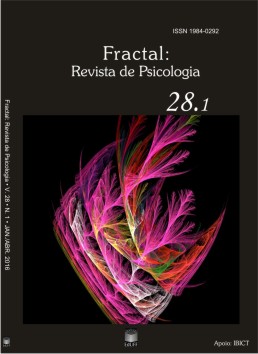From “do not give away on your desire” to “benedictory of the desire”: considerations about the ethics to Lacan
Keywords:
desire, ethics, happiness, enjoyment, moraleAbstract
In the Seminar of ethics, Lacan has opposed the analytical pastoral and the “do not give away on your desire” ethics. By putting the desire as a parameter, such an ethics questions the universal values to achieve a supposed good life. Here we compare this formulation to the ethics of the “benedictory of desire”, highlighted by Lacan in Television. If in the 7th Seminar we have a critics about the ideal of happiness, associated to the market of the goods, on the “benedictoty of desire” ethics happiness appears only as a symptom, tied to the different modes of enjoyment, which is a possible way to question about the contemporary injunction to enjoy, bound to a certain “high performance” culture.Downloads
References
ALENCAR, S. et al. A condição errante do desejo: os imigrantes, migrantes, refugiados e a prática psicanalítica clínico-política. Revista Latinoamericana de Psicopatologia Fundamental, São Paulo, v. 12, n. 3, p. 497-511, set. 2009.
BAAS, B. O desejo puro. Rio de Janeiro: Revinter, 2001.
BARROS, R. R. O anti-Édipo da psicanálise. Opção lacaniana: Revista Brasileira Internacional de Psicanálise, São Paulo, n. 42, p. 64-69, fev. 2005.
BATAILLE, G. O erotismo. Lisboa: Antígona, 1988.
BEZERRA JR., B.; FIGUEIREDO, L. C.; HORNSTEIN, L. Psicanálise: uma leitura da condição humana. Percurso, São Paulo, ano XXII, n. 42, jun. 2009. Debate. Disponível em: <http://revistapercurso.uol.com.br/index.php?apg=artigo_view&ida=41&ori=edicao&id_edicao=42>. Acesso em: 10 jan. 2011.
BIRMAN, J. Os signos e seus excessos: a clínica em Deleuze. In: ______. Gilles Deleuze: uma vida filosófica. São Paulo: 34, 2000. p. 463-478.
DELEUZE, G. Pensamento nômade. In: ______. Nietzsche hoje: Colóquio de Cerisy. São Paulo: Brasiliense,1985. p. 56-76.
DELEUZE, G. Post-scriptum sobre as sociedades de controle (1972-1990). In: ______. Conversações. São Paulo: 34, 1992. p. 219-226.
DELEUZE, G.; GUATTARI, F. Kafka: pour une literature mineure. Paris: Minuit, 1975.
DELEUZE, G.; GUATTARI, F. Mil platôs: capitalismo e esquizofrenia. São Paulo: 34, 1995. v. 2.
DELEUZE, G.; GUATTARI, F. O anti-Édipo: capitalismo e esquizofrenia (1972). Lisboa: Assírio & Alvim, 2004.
DELEUZE, G.; PARNET, C. Psicanálise, morta análise. In: ______. Diálogos. São Paulo: Escuta, 1998. p. 93-141.
FORTES, I. Anorexia: o traço da obstinação na clínica psicanalítica. Revista Latinoamericana de Psicopatologia Fundamental, São Paulo, v. 14, n. 1, p. 83-95, mar. 2011.
FOUCAULT, M. Anti-Édipo: introdução à vida não-fascista. In: ______. Dossiê Deleuze. Rio de Janeiro: Hólon, 1991. p. 81-84.
FOUCAULT, M. História da sexualidade: a vontade de saber. 17 ed. São Paulo: Graal, 1988. v. 1.
KAUFMANN, P. Dicionário Enciclopédico de psicanálise. Rio de Janeiro: J. Zahar,1996.
LACAN, J. O Seminário: mais, ainda (1972-1973). Rio Janeiro: J. Zahar, 1985. livro 20.
LACAN, J. O Seminário: a ética da psicanálise (1959-1960). Rio de Janeiro: J. Zahar, 1988. livro 7.
LACAN, J. O Seminário: o avesso da psicanálise (1969-1970). Rio de Janeiro: J. Zahar, 1992. livro 17.
LACAN, J. A direção do tratamento e os princípios de seu poder (1958). In: ______. Escritos. Rio de Janeiro: J. Zahar, 1998a. p. 591-652.
LACAN, J. Kant com Sade (1963). In: ______. Escritos. Rio de Janeiro: J. Zahar, 1998b. p. 776-803.
LACAN, J. Televisão (1974). In: ______. Outros Escritos. Rio de Janeiro: J. Zahar, 2003. p. 508-543.
LACAN, J. O Seminário: de um outro ao Outro (1968-1969). Rio de Janeiro: J. Zahar, 2008. livro 16.
MALISKA, M. E. Sintomas atuais e novas formas de gozo. Psicanálise & Barroco em revista, Rio de Janeiro, v. 8, n. 2, p. 112-120, dez. 2010.
MARX, K.; ENGELS, F. O Capital: crítica da economia política (1867). São Paulo: Abril Cultural, 1983, v.1.
MILLER, J.-A. Matemas I. Rio de Janeiro: J. Zahar,1996.
NIETZSCHE, F. Genealogia da moral: uma polêmica. São Paulo: Companhia das Letras,1998.
RAJCHMAN, J. Eros e verdade: Lacan, Foucault e a questão da ética. Rio de Janeiro: J. Zahar, 1993.
RINALDI, D. Ética e desejo: da psicanálise em intensão à psicanálise em extensão. Intersecção Psicanalítica do Brasil. Disponível em: <http://www.interseccaopsicanalitica.com.br/int-biblioteca/DRinaldi/Doris_Rinaldi_Etica_desejo_psican_intenc_psican_extens.pdf>. Acesso em: 13 dez 2010.
SÓFOCLES. Antígona. São Paulo: Paz e Terra, 1996.
ZIZEK, S. La marionnette et la nain: le christianisme entre perversion et subversion. Paris: Seuil, 2006a.
ZIZEK, S. O desejo, ou a traição da felicidade (entrevista com Slavoj Zizek). São Leopoldo: UNISINOS, 2006b. Disponível em: <http://www.ihu.unisinos.br/index.php?option=com_content&task=view&id=321&Itemid=89>. Acesso em: 12 ago. 2009.
Downloads
Published
How to Cite
Issue
Section
License
Authors publishing in this journal agree to the following terms:
- Authors retain copyright and grant the journal the right of first publication, with the work simultaneously licensed under the Creative Commons Attribution License allowing sharing of the work with acknowledgement of authorship of the work and initial publication in this journal.
- Authors are permitted to enter into additional contracts separately for non-exclusive distribution of the version of the work published in this journal (e.g., publishing in an institutional repository or as a book chapter), with acknowledgment of authorship and initial publication in this journal.

This work is licensed under a Creative Commons Attribution 4.0 International License.
To the extent possible under the law, Fractal: Journal of Psychology has waived all copyright and related rights to the Reference Lists in research articles. This work is published in: Brazil.
To the extent possible under law,Fractal: Journal of Psychology has waived all copyright and related or neighboring rights to Reference lists in research articles. This work is published from: Brazil.







